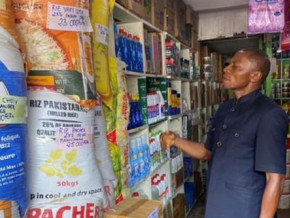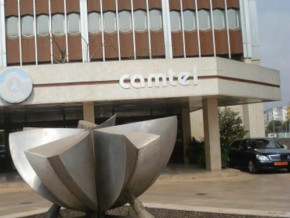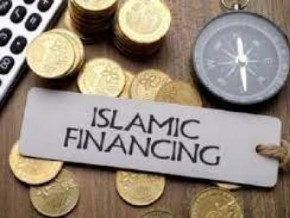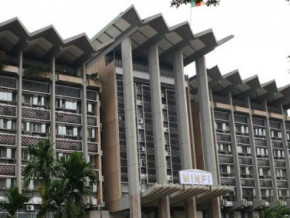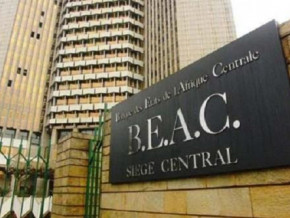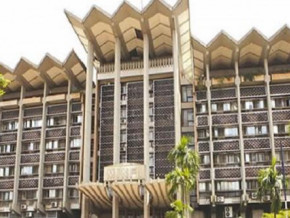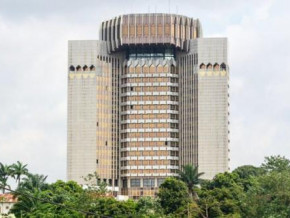
Chantal Elombat Mbedey: “After the BMN’s intervention, some companies increased their staff”

(Business in Cameroon) - She is the director of the Bureau de Mise à Niveau of Cameroonian companies. In this interview, the top official dives into the missions of this public entity, provides
a review of its activities so far, and tells us about the advantages that upgrading offers businesses, in a context where trade barriers between countries are falling.
Could you tell us briefly what the Bureau de Mise à Niveau of Cameroonian companies (BMN) is?
First off, thank you for showing interest in the Bureau de Mise à Niveau (BMN) of Cameroonian companies. The BMN was established by Order No. 221 CAB/PM of December 16, 2011, under the national strategy to boost the Cameroonian economy’s competitiveness. The BMN is placed under the technical supervision of the Ministry of Economy, Planning, and Land Management (MINEPAT). Its main mission is to implement the government’s policy concerning supporting the upgrading and financial restructuring of industrial Cameroonian businesses.
Specifically, the BMN is tasked, among others, to elaborate and implement programs for the upgrading and quality management of businesses - in relation with concerned ministerial departments and institutions overseeing businesses, define and apply eligibility standards for companies enrolled in the National Program for Upgrading (PNMAN) as well as modalities for award premiums to these companies, help establish the government’s policy in terms of business upgrading and on a larger scale improve the national economy’s competitiveness. The BMN has a steering committee (COPIL) whose composition was noted by decision n°016 CAB/PM of April 20, 2012. It also has a management which we are honored to lead.
Which sectors or activities are you focused on?
The Bureau de Mise à Niveau works with secondary sector businesses, that is those active in the processing sector. To be selected, these firms must meet the eligibility criteria of the National Program for Upgrading. One of the criteria is to operate in any of the following sectors: agribusiness, textile and clothing, wood, tourism, chemicals, leather and footwear, metallurgy, steel, mechanics, electricity and derivatives, and construction. However, our activities also cover all sectors related to the industry.
Concretely, what actions do you take in favor of industrial businesses that benefit from the BMN’s expertise?
Once a business adheres to the PNMAN, the global or specific upgrading of businesses selected by the BMN’s steering committee begins with a diagnostic made by top-level experts, the elaboration of tangible (purchase of production equipment, rehabilitation of product manufacturing zones...) and intangible (support for commercial management, support for the implementation of cost accounting, good hygiene practices, good manufacturing practices, reduction of energy consumption, development and implementation of procedure manuals, implementation of management systems ISO 9001, ISO 22000, ISO 14001, ISO 17025, ISO 45001, sales techniques, technical assistance, participation in national and international fairs, human resources management, information system, fund mobilization) investment plans. This is followed by the implementation of these plans and the awarding of premiums.
Regarding the premiums, businesses benefit from the following: 90% coverage of the costs of global or specific diagnoses and the formulation of related upgrading plans (diagnosis premium on intangible investment), 80% of the costs of intangible investments (human resources management, organization, know-how, studies, prospecting, other technical assistance actions, training, accounting, implementation of management systems, etc.) identified in the framework of upgrading plans validated by the Steering Committee (premium on intangible investments), 20% of the cost of tangible investments made by companies with a ceiling of CFAF50 million (premium on tangible investment). This is briefly some of the personalized services we provide companies enrolled in the PNMAN.
Generally, what’s your opinion regarding how Cameroonian businesses perceive the programs you implement
Answering your question is not easy for me since I believe that it is the businesses that benefit from the BMN’s services that are more fit to assess the value of what we do for them. Nonetheless, based on my observations on the field, I can tell you that many companies are satisfied and ask for more. An example is one of the latest feedback we got regarding our activities related to the 2021 CHAN preparations.
As instructed by the government, via the Ministry of Tourism and Recreation (MINTOUL), the BMN and CTA-CAM boosted the capacities of hotels selected and recommended for the 2021 CHAN to meet the good hygiene, restoration, and reception standards, and we have helped put in place a Hazard Analysis Critical Control Point (HACCP). I can confirm that many companies in this sector understand how important it is to be up-to-date and want more. What we now hope is that they will effectively adhere, voluntarily, to the PNMAN.
Despite the interest they show in upgrading, how do you explain that many firms still hesitate to reach out to you?
Considering the pertinence of the upgrading, especially in the free-trade context, this is a mystery. Regardless, we think we are the ones that must act against the reasons behind this situation. Indeed, many firms believe, wrongly so, that the BMN is the backdoor of the tax office. This false belief is fueled by a tradition of opacity in many companies. We keep sensitizing to change people’s perception but this is a challenging task and we can’t afford to be disheartened because the stakes at play are far too important for our country.
You often talk about Economic Partnership Agreements (EPAs) with the European Union and the African Continental Free Trade Area (AfCFTA). Don’t these further make upgrading more relevant and necessary for businesses?
Absolutely! Our companies must know that economic partnership agreements (EPAs) with the European Union (EU) and the African Continental Free Trade Area (AfCFTA) bear both threats and opportunities for them. This is needed to protect themselves against these threats which mainly come in the shape of competition with foreign firms. At the political-economic level, this competition could cut tax earnings for the State which would be greatly fragilized as it would have fewer means to intervene. This scenario, given the already tense security situation in the northwest, southwest, far north, and to a certain degree also the east and Adamaoua regions, must be avoided at all cost.
At the social level, the potential closure of a large number of companies would significantly increase unemployment, which is presently non-negligible. According to the Ministry of employment and professional training, 27% of the country’s youths were unemployed in 2016. Surely, this figure has not fallen since considering that companies such as the Cameroon Development Corporation (CDC) had to lay off thousands of workers because of security issues in the southwest. Taking all these into account, upgrading businesses is not an option but the way ahead to tap into opportunities of both the local and international markets. This however requires being able to produce in quality and quantity.
What do you suggest to tackle threats that are inherent in the free-trade policy in place?
We have no lessons to give or miracle recipes to prescribe. The government already grasped the nettle by creating the BMN. Cameroon, which aims to become emergent by 2035, must take a leaf out of the page of countries that successfully leveraged upgrading to develop their industry and grow their economy. For example, qualitative surveys conducted by the Tunisian Bureau de Mise à Niveau have proven the efficiency of this strategy. These surveys prove that upgrading is at the root of the Tunisian economy’s blossoming, the establishment of new industrial firms in the country, and the creation of various partnerships with multinationals.
The Bureau de Mise à Niveau has recently adopted a strategy document covering the 2022-2024 period. What explains this move after so many years into existence?
This document is very important in the sense that it serves as a compass for the BMN. It tackles a major issue -upgrading- in Cameroon and states the shortcomings of the system in place concerning competitiveness. Among the solutions it preconizes in this framework, the document gives the BMN its rightful place, that is as the central actor behind upgrading in Cameroon. This document puts things back in focus; the activities, actions, and tasks for upgrading and financial restructuring, the two main missions the government gave the BMN.
We also hope that all the available or possible means needed for upgrading will be provided to the BMN. Putting the BMN in this central position should prevent third parties from getting or addressing the wrong partner or entity. They will all turn to the BMN. Given that upgrading is well understood and supported by all economic actors, there are great chances that the BMN will deliver the results expected by both the decision-makers and targeted businesses.
At present, how many companies have been upgraded via the BMN, and how much has been awarded in premiums so far?
At the moment, 777 companies have voluntarily joined the BMN’s National Program for Upgrading. We have conducted 315 preliminary diagnostics in these companies and 93 upgrading plans were validated by our steering committee. Concerning awarded premiums, they have exceeded one billion CFA. This figure should rapidly increase since we have dispatched experts to support many companies that struggle to implement their upgrading strategy at a good pace.
Doesn’t voluntary adhesion reduce the scope of intervention of the BMN?
It is the private sector that we are dealing with here, you know. And what’s specific about the private sector is that the boss or founder of a given business secures the funds needed to start this business on their own. It could be savings or loans. So, it is not easy for him or her to let someone else tell them to change the way they operate. And that is why the government wanted this decision to be voluntary. This way, every business owner, after knowing more about the BMN’s support, can voluntarily decide to join its National program for Upgrading or not. If it had been forced on them, we wouldn’t have achieved the results we have today. On another side, the volunteering model can limit the BMN’s action range. The State, since it injects money in the upgrading process, could encourage the adhesion of some strategic companies to the PNMAN. This, because it expects from some sectors of activity and some businesses results that will contribute to the diversification of its economy. These include companies that weigh heavily in the Cameroonian economy.
How does upgrading impact the competitiveness of businesses that joined the BMN’s program?
This is not to boast but I would say that within the means we were given, we have attained quite impressive results, especially in terms of turnovers, financial autonomy, and net results. After the BMN’s intervention, some companies increased their staff, a major win considering that the Head of State made fighting unemployment one of his top priorities. We have also achieved some results regarding the improvement of how the production process is understood and this boosted productivity in some businesses.
The results recorded by the BMN were validated by a technical and financial audit carried out in 2019 by Auditec-Foirier and ordered by the French Development Agency (AFD). This audit covered the 2017-2019 budgetary support per sector of the third C2D. Results from the audit indicated that the BMN was the only sectoral beneficiary with almost all its performance indicators in the green, despite receiving funds late.
Interview with Brice R. Mbodiam
Mags frontpage
- Most read 7 days
- shared 1 month
- read 1 month




